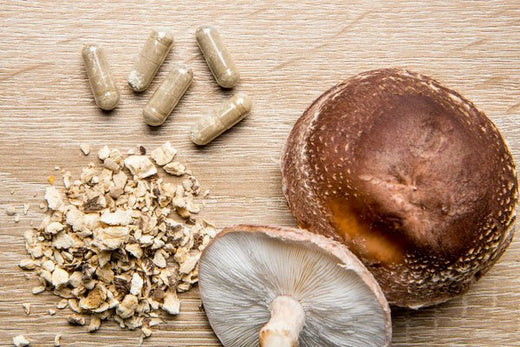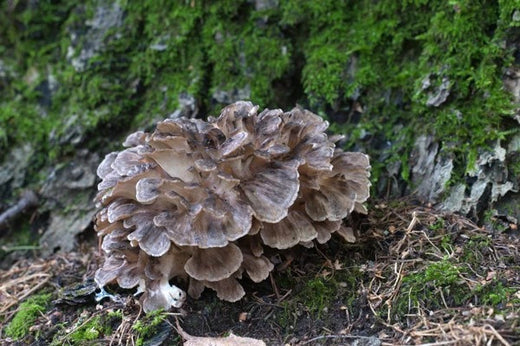Combat Your Allergies Naturally | 6 Adaptogens to Consider

Seasonal allergies are a widespread issue, impacting an astounding 70 million individuals in the US and billions globally. As pollen, dust, and mold spores trigger symptoms like itchy, watery eyes and sneezing, we recognize the need for effective relief.
Though allergen immunotherapy and antihistamines offer some benefits, natural herbal solutions may prove more advantageous for your long-term well-being.
In this article, we delve into the origins of allergies, typical treatments, and the most effective herbs for allergy relief. We'll also explore the link between allergies, gut health, diet, and the immune system, as well as the potent health advantages of adaptogens and medicinal mushrooms.
As spring and summer roll in, countless individuals face the challenges of hay fever, mold allergies, and respiratory issues. Traditional short-term solutions include antihistamines and other medications, but we'll discuss why it's worth considering alternatives to pharmaceuticals like intranasal corticosteroids and antihistamines.
So, how can you alleviate allergies naturally?
Thankfully, natural remedies can help soothe symptoms without adverse side effects. Keep reading to discover the impressive impact of adaptogens on allergies and the top herbs to consider for allergy relief.
Table of Contents
-
Understanding The Causes Of Allergies
-
Your Immune System And Allergies
-
What does histamine do in the body?
-
Leukotriene Function in Our Body
-
Empower Your Immune System to Combat Allergies
-
The Surprising Connection Between Gut Health and Allergies
-
The Path to Allergy-Free Living
-
What are the benefits of adaptogens?
-
6 Adaptogens to Fight Allergies Naturally
-
Reishi Mushroom
-
Ashwagandha root
-
Chaga Mushroom Extract Powder
-
Astragalus root Extract
-
Holy Basil Tulsi Extract Powder
-
Agaricus blazei Mushroom
-
Concluding
-
References

Understanding The Causes Of Allergies
Allergies can sneak up on us when we least expect it, disrupting our daily routines and making it difficult to live a normal life. With the change of seasons, we are exposed to a wide range of allergens, from pesky pollen to other airborne particles, triggering unwanted symptoms that force us to rely on antihistamines and eye drops just to get by.
So, what exactly causes allergies? Our immune system responds to substances that our body has developed an allergy to, commonly known as allergens. These allergens can be found in a variety of sources, such as food, mold, dust mites, animal dander, snake venom, insect stings, latex, and certain medications.
When our immune system mistakes these substances as a threat, we experience an immune response, leading to the development of an allergy. Sneezing, an itchy and runny or blocked nose, red and watering eyes, wheezing, chest tightness, shortness of breath, coughing, and even hives, swelling, and stomach issues are all common symptoms of allergies.
Hay fever, or allergic rhinitis, is one of the most common types of allergies, particularly seasonal allergies. It can also lead to sinusitis, congestion, breathing difficulties, and even asthma and eczema.
Don't let allergies control your life. Learn more about your triggers, take preventative measures, and seek professional medical help to get the relief you need.
Your Immune System And Allergies
Discover the inner workings of your immune system as it battles allergens! Allergies are your body's way of trying to protect itself from potentially harmful foreign substances like pollen, dust, or mold. Sometimes, your immune system goes into overdrive, reacting more than necessary to keep you safe.
Picture dendritic cells as your body's front-line defenders. These immune cells are found in the mucosal layer of your ear, nose, throat, lungs, and gut. When an allergen enters your body, dendritic cells snatch a piece of it and present it to T-cells, which are part of your adaptive and cell-mediated immune systems.
Identifying Immune Cells Involved With Allergies
As T-cells interact with the allergen, they transform into allergen-specific Th2 cells, or T-helper cells. Th2 cells then tell B-cells (also part of your adaptive immune system) to produce antigen-specific immunoglobulin E, or IgE. This triggers the production and release of mast cells, basophils, and neutrophils.
Mast cells and basophils play crucial roles in hay fever, atopic states (such as asthma and eczema), and allergies. When activated, they release various pro-inflammatory and immune mediators, like prostaglandins, leukotrienes, proteoglycans, and cytokines, which initiate and maintain an inflammatory response.
Research reveals that allergic rhinitis (hay fever) occurs in two distinct stages. The first, immediate reaction causes itchiness and sneezing as mast cells work to expel the antigen. Histamine, prostaglandins, and leukotrienes are secreted to help get rid of the allergen. The second, late-phase reaction can last up to six hours after exposure to the allergen.
Ever wondered why your nose gets blocked during allergy attacks? During the second reaction, immune cells like eosinophils, mast cells, and T-cells migrate to your nasal passage. While they work to clear the congestion, they temporarily block your nasal passage in the process.
What does histamine do in the body?
Histamine is a pesky little chemical found in some of the body's cells, and it's often the culprit behind those annoying allergy symptoms like itching, sneezing, and a runny nose. But did you know that antihistamines, the go-to solution for these symptoms, can come with some pretty gnarly side effects? That's right – drowsiness, dizziness, and constipation are just a few of the negative effects of using antihistamines in the long term.
But don't worry, there are natural alternatives to antihistamines that can provide a healthier, more long-term solution. And while we're at it, let's talk about prostaglandins, another key player in allergies and inflammation.
So, what are prostaglandins? These little guys are lipids (fats) that are created at the sites of tissue damage or infection, and they play a crucial role in our body's response to injury and illness. They control blood flow, muscle contraction, and blood clot formation/removal.
But back to histamine. This pesky little chemical is created from the amino acid histidine and is released from mast cells when IgE binds to the receptors on the outside of the cell. This causes a whole host of allergy symptoms, including itching, flushing, and difficulty breathing. And while antihistamines can provide some immediate relief, they're just a band-aid solution – they won't address the underlying issues that may be causing your allergies.
So, what's the solution? Natural antihistamine alternatives and herbal remedies can provide a healthier, more long-term fix for your allergy symptoms. And while intranasal corticosteroids can also help alleviate symptoms, they come with their own set of side effects, like headaches and nasal dryness.
Leukotriene Function in Our Body
Leukotrienes are an essential group of molecules that play a vital role in your body's immune response. Produced by various cells, including leukocytes and macrophages, these molecules contribute to the immune system's fight against allergens. As inflammatory mediators, leukotrienes work closely with prostaglandins, affecting muscle contraction in your lungs, increasing blood vessel permeability, and supporting the arrival and activation of leukocytes to boost your immune response.

Empower Your Immune System to Combat Allergies
A strong immune system is your first line of defense against allergens. Maintaining a healthy immune system helps your body efficiently eliminate allergens before they can trigger allergy symptoms. Enhancing your immune system involves reducing inflammation, improving gut health, avoiding certain foods, and incorporating adaptogens into your lifestyle.

The Surprising Connection Between Gut Health and Allergies
Your gut plays a significant role in managing allergies, with 70-80% of your immune tissue residing in your digestive tract. A healthy gut equates to a robust immune system, better prepared to tackle allergens. Histamine receptors, critical components in the inflammation process, are predominantly found in the gut, further emphasizing the link between gut inflammation and allergies.
For individuals with inflammatory bowel disease or Crohn's disease, an overactive immune system leads to increased histamine levels and activity. Mast cells in these individuals release more histamine, causing inflammation to increase.
Understanding the Leaky Gut Connection
The gut lining, a one-cell-thick barrier between your body and the external world, plays a crucial role in your immune system. This highly monitored area is where your immune system first responds to potential threats. Over time, stress and poor dietary choices can cause gaps in the gut lining, allowing allergens to penetrate, triggering a low-grade inflammatory and immune response.
An overactive immune system is the driving force behind allergies, making the link between gut health and atopic conditions undeniable. To effectively combat hay fever and allergies, healing the gut is essential.

The Path to Allergy-Free Living
Improving gut and systemic health, balancing the immune system, reducing stress, and modifying your diet to avoid high-histamine foods and limit caffeine intake can help alleviate allergies. By taking these steps, you'll be on your way to a healthier, allergy-free life.
This personalized journey towards better gut health may take time, but the positive changes in your body will make it worth the wait.
Transform your eating habits by adopting a diet similar to Paleo or Pegan, focusing on reducing or eliminating grains, legumes, beans, and processed carbs and sugars.
Be mindful of high histamine foods, even the healthy ones, especially if you're experiencing allergy symptoms. Some of these sneaky culprits include:
- Chocolate (cacao)
- Avocado
- Tomatoes
- Spinach
- Eggplant
- Cheese and dairy products
- Nuts
- Citrus fruits like kiwi, lemon, lime, and pineapple
- Fermented foods such as tamari, tempeh, and sauerkraut
- Smoked, processed, and cured meats
- Shellfish
- Food additives like benzoate in skincare products, sulfites in dried fruits and wine, nitrites in processed meats and bacon, glutamate in MSG and processed/slow-cooked foods, and food dyes.
Don't forget to also cut back on diamine oxidase (DAO) blockers. DAO is essential in breaking down histamine-rich foods and may help alleviate histamine intolerance symptoms. Foods that hinder DAO production include:
- Alcohol
- Black tea
- Green tea
- Coffee and other caffeinated beverages
Follow this health regime with patience and an open mind, and soon, you'll witness a noticeable reduction in inflammation and allergies.
What are the benefits of adaptogens?
For those unfamiliar with adaptogens, they are a group of herbal remedies derived from plants and fungi that do exactly what their name implies – they help your body adapt to its environment more effectively.
Adaptogenic herbs excel at reducing stress and soothing the central nervous system. They achieve this by entering the body and promoting balance – or homeostasis – across various systems at the same time.
The beauty of adaptogens lies in their ability to intelligently respond to different situations. They can boost a weakened immune system during colds, flus, or viral infections, as well as calm an overactive immune system in instances like autoimmune disorders or as a natural allergy solution.
Adaptogens also offer protective benefits for the adrenals and nervous system, helping to mitigate the effects of stress.
In addition to bolstering the immune system, adaptogenic herbs can reduce inflammation, providing relief from hay fever and easing allergy symptoms.
6 Adaptogens to Fight Allergies Naturally
Embrace the power of adaptogens and free yourself from the discomfort of seasonal allergies. Here are six of the most potent adaptogens for allergy relief:

Reishi Mushroom
Reishi mushroom (Ganoderma lucidum) is revered as the queen of medicinal mushrooms and is a personal favorite alongside Chaga mushroom.
Extensively researched, Reishi mushrooms offer a wide range of health benefits. With centuries of use behind them, they've demonstrated significant immune-modulating and immune-boosting properties.
Known as the "Ultimate Anti-Stress Herb," Reishi mushrooms naturally calm the central nervous system, protect and support the body against stress, aid in reducing leaky gut, and offer high triterpenoid compounds to help alleviate allergies.
Reishi mushrooms have also been shown to reduce nasal congestion and hypersensitivity caused by pollen exposure.
In a 2012 animal study, daily oral consumption of Reishi for eight weeks suggested its potential as a useful therapeutic drug for treating patients with allergic rhinitis.
Discover the Power of Ashwagandha Root
Unveil the secrets of Ashwagandha root (Withania somnifera), a prized adaptogenic herb that has been cherished for centuries in Ayurvedic medicine. Renowned for its remarkable ability to alleviate physical and cognitive stress, this potent calming tonic works wonders to diminish inflammation and strengthen immunity under stressful conditions.

Ashwagandha
Ashwagandha root can help alleviate allergies? By addressing the root cause of hay fever and atopic conditions - leaky gut - daily consumption of this miraculous herb can enhance gut health, fortify your immune system, and provide relief from allergy symptoms.

Chaga Mushroom Extract Powder
Introducing Chaga mushroom (Inonotus obliquus), the undisputed "King of mushrooms," known for its remarkable ability to stabilize mast cell activity and reduce histamine release, providing relief from allergy symptoms. Chaga's potent melano-glucan complexes and antimicrobial properties help eradicate harmful bacteria, promoting gut health. For allergy relief, Chaga and Reishi reign supreme.

Astragalus root Extract
Experience the revitalizing power of Astragalus root (Astragalus membranaceus), a potent energizing herb that bolsters the immune system. Hailed as the "Supreme Protector" in Traditional Chinese Medicine (TCM), Astragalus supports an overactive and exhausted immune system, providing relief from seasonal allergic rhinitis (SAR) symptoms while enhancing overall well-being.

Holy Basil Tulsi Extract Powder
Embrace the soothing properties of Holy Basil (Ocimum sanctum), also known as Tulsi, another revered Ayurvedic herb. Rich in antioxidants, anti-inflammatory compounds, and immune-boosting properties, Holy Basil helps to alleviate physiological stress, making it an ideal daily supplement for natural allergy relief.

Agaricus Blazei Mushroom
Meet Agaricus blazei, the Royal Sun blazei mushroom, a delectable and therapeutic ally in the fight against allergies. This amazing mushroom has the unique ability to balance Th1 and Th2 activity, regulating mast cell activation, IgE release, and histamine production. With Agaricus blazei extract, you can prevent allergies and enjoy a more harmonious, allergy-free life.
Concluding
Allow me to emphasize that inflammation and immune cells are not our enemies. In fact, they play a vital role in our well-being, enabling us to lead healthy lives for extended periods.
Nonetheless, in the context of allergies, our immune system can become excessively active, leading to those pesky and bothersome allergy symptoms as it operates in high gear.
While histamine or mast cells may not be the direct cause of common allergies, they do contribute to the symptoms we experience. It's crucial to remember that their primary function is to safeguard our health.
Our immune system is a sophisticated, intelligent network constantly working to maintain our overall health. By incorporating immune-boosting foods and supplements into your diet, you can prevent various allergies from bothering you.
Over-the-counter antihistamines may offer temporary relief, but they're not a long-lasting solution to allergy woes.
Luckily, nature has provided us with potent antihistamines in the form of ancient superfoods, such as adaptogenic herbs and medicinal mushrooms. These natural allergy remedies deliver the additional support you need to keep symptoms at bay, including immune system reinforcement, stress reduction, inflammation control, improved gut health, and better sleep quality.
References
-
The Pathophysiology, Diagnosis and Treatment of Allergic Rhinitis - https://www.ncbi.nlm.nih.gov/pmc/articles/PMC2846743/
The complex pathophysiology of allergic rhinitis: scientific rationale for the development of an alternative treatment option - https://aacijournal.biomedcentral.com/articles/10.1186/s13223-018-0314-1
Nasal mucosal mast cells and histamine in hay fever. Effect of topical glucocorticoid treatment - https://www.ncbi.nlm.nih.gov/pubmed/3653999
Roles of histamine and its receptors in allergic and inflammatory bowel diseases - https://www.ncbi.nlm.nih.gov/pmc/articles/PMC4305649/
Leukotrienes - https://www.ncbi.nlm.nih.gov/pubmed/6311078
LiverTox: Clinical and Research Information on Drug-Induced Liver Injury; Antihistamines - https://www.ncbi.nlm.nih.gov/books/NBK547896/
Long-term Anti-inflammatory and Antihistamine Medication Use and Adult Glioma Risk - https://cebp.aacrjournals.org/content/cebp/17/5/1277.full.pdf
Microbiome in the Gut-Skin Axis in Atopic Dermatitis - https://www.ncbi.nlm.nih.gov/pmc/articles/PMC6021588/
The mast cell stabilizing activity of Chaga mushroom critical for its therapeutic effect on food allergy is derived from inotodiol - https://www.sciencedirect.com/science/article/pii/S1567576917304459
Efficacy and safety of Astragalus membranaceus in the treatment of patients with seasonal allergic rhinitis - https://www.ncbi.nlm.nih.gov/pubmed/19504468
Suppression of inflammatory and allergic responses by pharmacologically potent fungus Ganoderma lucidum - https://www.ncbi.nlm.nih.gov/pubmed/24948193
Powell, Martin. Medicinal Mushrooms - A Clinical Guide. Mycology Press. Kindle Edition.
Effect of Ganoderma lucidum on pollen-induced biphasic nasal blockage in a guinea pig model of allergic rhinitis -https://www.ncbi.nlm.nih.gov/pubmed/21698671
Does Medicinal Mushroom Agaricus Blazei Protect Against Allergy and Asthma? - https://clinicaltrials.gov/ct2/show/NCT03198455
A review on phytochemical and pharmacological properties of Holy basil (Ocimum sanctum) - https://www.sciencedirect.com/science/article/abs/pii/S0926669018302711
Intranasal Corticosteroids for Allergic Rhinitis - https://accpjournals.onlinelibrary.wiley.com/doi/abs/10.1592/phco.22.16.1458.33692
Written by Eliza Hedley
Eliza Hedley is an Australian born health, mindset and abundance enthusiast obsessed with helping millennial's experience living at a higher level.
Eliza's relaxed new age approach and understanding of nutrition and wellness sees her empowering and coaching individuals to understand that their health is the ultimate asset. Upon experiencing first hand the power and place of tonic herbalism and medicinal mushrooms in everyday life, Eliza’s become an adaptogen fangirl and feels their utilisation in today’s world is essential for abundance and wellbeing.






